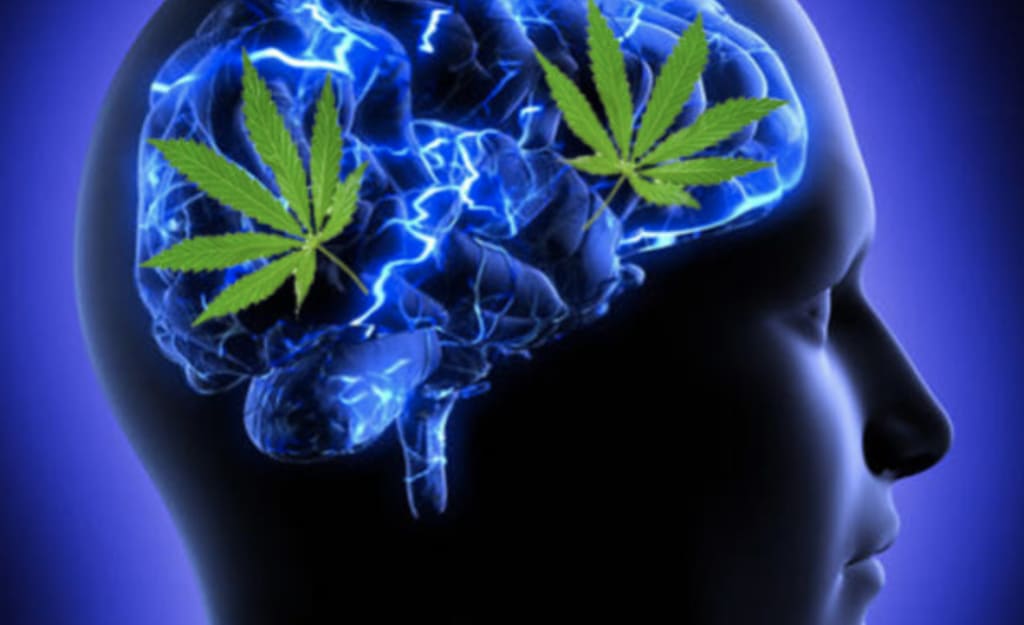Marijuana on the Brain
The Basic Neuroscience Behind Cannabis Use

In January of 2014, Colorado became the first state in America to legalize the selling of marijuana products to adult consumers. Since then, Colorado has made billions of dollars, which in turn financed businesses and state instead of criminals. Crime has also dropped more than 10 percent since the substance was legalized, making Colorado a safer and richer state. Along with Colorado, states such as Washington and Oregon have also fully legalized marijuana, making weed a rapidly growing, widely known item. Not only is marijuana becoming super popular over the years, it has developed its own culture as well. It has even changed the culture of weed here on the islands, causing the point of view of the plant to be more accepted. Although marijuana has many positive impacts on revenue, health, and crime, how does it affect one’s cognitive abilities?
The general opinion about marijuana is that it negatively affects one’s cognition by causing a cognitive decline over a long period of time smoking the plant (Ranganathan). Focused mostly on memory, marijuana could possibly have a negative impact on one’s brain. The reason for this is because marijuana has THC (Tetrahydrocannabinol) and this chemical alters the way information is processed in the hippocampus, thus causing an impairment in cognitive abilities such as memory. Although this is true, according to the Cannabis use and Cognitive Dysfunction article I read, this generalization may not be entirely true. Here are a few academic articles I found either supporting or not supporting the assumption that marijuana negatively affects one's cognition, specifically memory.
Cannabis can have a positive impact, if not abused, according to Dr. Shrivastava. The bad news is that around 3 percent of the world’s adult and adolescent population abuses the drug. When considering memory, adolescents take in extremely high levels of THC. Teenage years are the time where most of one’s cognitive and psychiatric brain development takes place. Too much cannabinoids can harm or delay brain development. In this article about how cannabis can affect brain function, Dr. Shrivastava supports the general opinion of marijuana negatively affecting cognition. “Majority of studies have suggested a significant cognitive decline in cannabis abusers compared to non-abusers and healthy controls” (Shrivastava). This means that cannabis users who use the drug safely and less frequent saw more of a positive effect on cognition. While abusers of the drug saw a drop in cognition. The article then introduces a study done by Bartholomew, where users and non-users of marijuana were asked to perform in a video-based prospective memory task. Results showed marijuana smokers reported notably fewer location-action combinations than the non-users. Therefore, the study concluded that cannabis use has a detrimental effect on prospective memory ability in young adult users. Other negative effects from abuse of marijuana this study concluded was slower response time, prolongation of word viewing time, basic oculomotor deficit, residual verbal memory and executive functioning—all of which require cognitive demand.
The next two experiments come from the book, Marijuana: Effects on Human Behavior. Before going over the studies, the author brings to attention that marijuana varies from subject to subject, and there have not been enough studies to really see the true long term effects which, in turn, gives unreliable research. With that said, the two experiments tests memory scanning and free recall, which allow subjects to access their short-term storage, short-term retrieval, transfer from short-term memory to long-term memory and long-term memory retrieval.
In the first experiment done by Sternberg 1966-69, it was described as a memory-scanning paradigm. The purpose of this experiment was to study the process of accessing information in the STM. Subject were presented with an array of objects called a memory set, then had to recall the items by giving a positive response if it is a member of the set and a negative response if it does not belong. Instead of measuring the ability to memorize what the subjects just saw, Sternberg studied their reaction time. How this relates to the negative effects marijuana is that the authors of this book used this study to do research on weed user’s reaction time, in recalling newly presented items. The authors used active marijuana users and non-users as a placebo. Their results came to the conclusion that cannabis affects the processing of recently presented information by causing a kind of delay in information execution (Miller). Causing subjects who were high to respond slower than the placebo crowd.
The second experiment has to do with free recall memory tasks, which are tasks that require subjects to recall as many words from a list as they can post being shown the list. This study can show how a subject who is under the influence of pot's memory functions. According to the working memory model, within performing the task of free recall, there should be a complex flow of information going through the different storages of memory. At a certain period in looking at the list, subject’s STM reaches it’s capacity and drops old information to remember newer information. In regards to information retrieval in marijuana users, after presenting 10 lists consisting of 20 words, each subject was received either a placebo or 20 mg of THC. In both the immediate and delayed recall of the lists, the non-high subjects were able to remember more words and respond faster than the “high” subjects. Which again, supports the opinion that marijuana negative affects one’s cognitive memory.
The last three studies all suggest that being under the influence of marijuana can negatively cause a drop in short-term memory use. Said in a previous paragraph, THC alters or slows the information processing in the working memory. To give a brief summary of what goes on in one's brain when abusing marijuana; when people age naturally, a loss of neurons in the hippocampus occurs, which in turn impairs one’s ability to learn new information. According to the National Institution of Drug Abuse, constant THC exposure may cause the same loss of neurons in the hippocampus at an early age, therefore, causes one to have a failing short-term memory.
Before discussing a different theory on memory and marijuana, let’s talk about research supporting cannabis having an effect on one’s brain. This article tests the “effects of frequent marijuana use on memory-related regional cerebral blood flow.” The professors who performed the study states that it is uncertain that marijuana negatively or positively affects one’s cognitive functions. In order to prove this theory right or wrong, the professors used a PET scan to study subjects who are marijuana users’ and their brain activity concerning memory. Results showed, first of all, memory-related blood flow in marijuana users decreased in the prefrontal cortex, which is responsible for complex behaviors, such as planning or personality development. This could mean that adolescents who are actively smoking marijuana would develop a personality later on in life compared to non-active smokers. The results of active smokers also showed “an increase in memory-relevant regions of cerebellum, and altered lateralization in hippocampus.” When recalling words from a list, the marijuana smokers were able to recall 23 percent more of the end of the list than the controlled group while the control group were able to recall most of the words in the middle of the list compared to the marijuana smokers. This suggests that the subjects who smoke rely more on STM and have an unnatural activity in their hippocampus, which gives reliable evidence that smoking marijuana does effect, either negatively or positively, brain cognition.
Unlike the last few paragraphs, where marijuana negatively affects one’s ability in cognitive task, this next article suggests that there is a minimal effect on completing a complex cognitive task performance in experienced marijuana users. The study performed in this article had subjects either smoke one marijuana cigarette or not and then perform three different cognitive tasks, separated by 72 hours. The results of the study, according to Dr. Hart are that, “—marijuana significantly increased the number of premature responses and the time participants required to complete several tasks, (but) it had no effect on accuracy on measures of cognitive flexibility, mental calculation, and reasoning” (Hart). Therefore, one can conclude that experienced cannabis smokers are so acquainted with being “high” that their ability to complete complex cognitive tasks are not really affected.
To bring all the studies together, it seems that marijuana has more of a negative effect on one’s cognition than a positive one, or none at all. Especially when the subject started marijuana use as an adolescent. Not only is their memory affected, but their brain development is affected as well. In order to have the minimalist effects of cannabis to cognition, one has to probably wait until their brain has developed to start usage and do not overuse the drug. This way, your ability to process information and have it affect your brain will not be so prominent. All in all, the general opinion stated in the introduction, that marijuana negatively affects one’s cognitions, is not completely true. Instead, there are different factors to consider that effect how cannabis affects an individual’s cognitive abilities. Like other serotonin releasing drugs such as caffeine and chocolate, using marijuana in a balanced and spread out manner, one’s cognitive functions should not be affected as much.
About the Creator
Danyea Hays
Hello readers, my name is Danyea Hays and I am a psychology graduate. You can find many psychology articles and personal essays on my page. How you enjoy :)






Comments
There are no comments for this story
Be the first to respond and start the conversation.